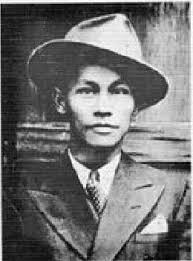
Carlos Bulosan, the self-educated Filipino writer who wrote America Is in the Heart, a novel that chronicles the lives of the early Filipino immigrants in the United States, was not just a literary writer. He was a social commentator and political essayist who wrote with a social conscience. In explaining the social context and political motivation of his writings, Bulosan wrote on January 17, 1955:
“The writer who sides with and gives his voice to democracy and progress is a real writer, because he writes to protect man and restore his dignity. He writes so that this will be a world of mutual cooperation, mutual protection, mutual love; so that darkness, ignorance, brutality, exploitation of man by another, and deceit will be purged from the face of the earth.”
In this passage Bulosan assumed the social obligation of a writer. Within his own personal and cultural experience in the United States, this meant writing not just about the evils of racism or the pain of cultural alienation, but the reality of corruption in society.
Because of Bulosan’s exposure to racism, many of his short stories reflect the interplay between the powerful and the powerless, and how corruption results from this tension – something that has characterized Philippine society for decades.
Corruption in all levels of society is a theme that Bulosan explores in some of his short stories. One form of corruption that he frequently manifests is bribery. In his story The Way of All Men, Bulosan presents this scenario of officers of the law accepting a bribe:
I saw three policemen talking to Uncle Sergio. I saw him give them some money under the table. They went to the poker table and began betting immediately. Then the chief of police came shouting and brandishing his gun, but the gamblers looked amusedly at him for a moment and went on with their games…Then my uncle and the chief went to the back room.
I followed them immediately. I wanted to know everything in my little world. But I was too late, coming upon them in the middle of a shady deal.
“Well,” the chief was saying, “how about fifteen per cent?”
“But, chief,” Uncle Sergio protested, “the capital is not mine. I’m only working here on a commission basis. The place and capital belong to my rich brother. You have heard of him?”…
When we arrived at the place, Uncle Sergio was almost weeping. The chief had already stopped the games because my uncle would not agree to give him fifteen per cent of the stake. But Uncle Sator went to the chief and whispered something to him. And the chief began to smile blissfully…
“Now, about my twenty-five per cent?”
“Twenty-five per cent?” Uncle Sator said with surprise. “You deserve thirty-five per cent for keeping peace and order.”
The chief of police beamed. “Yes, thirty-five per cent. I understood you the first time. It’s always easier to deal with a gentleman with money.”
Another aspect of this corruption theme is distrust and exploitation among thieves, that is, the exploited quickly becomes the victims of their own circumstances; they become exploiters of each other. To illustrate this point, Bulosan continues his story of how Uncle Sator manipulates as he is manipulated. To show his gratitude to Uncle Sator, the chief of police tells Uncle Sator that Uncle Sergio has been hiding part of the gambling proceeds in his house. Suspecting that his share of the proceeds from gambling is slowly being lost, Uncle Sator decides to stage a holdup of his own gambling house. His accomplice this time is another brother, Uncle Soyoc, the bandit. Bulosan reveals in The Betrayal of Uncle Soyoc that Uncle Soyoc is willing to do the dirty job. But just like the chief of police, he asks for a certain percentage of the gambling proceeds. As Uncle Soyoc and Uncle Sator discuss how each one will benefit from their scheme, Bulosan, through the child-narrator, points out how because of corruption, cheating has become a virtue:
“It was very educational as well as inspiring to watch two men of the world outwit each other, and trying, of course, to take advantage of each other. In that bizarre world where I grew up, where cheating was a virtue, where lying was another virtue, and the play and interplay of chicaneries made me doubt the value of the other virtues, those that were preached in the schools and churches. Now as I listened to my two uncles, who had run the gamut of human confidences and secrets, who had divested themselves of all illusions and regarded honesty as a sure sign of weakness, I became a man among men with no childhood.”
As the title indicates, The Betrayal of Uncle Soyoc reveals how Uncle Sator betrays Uncle Soyoc to the corrupt chief of police after he held up and robbed the gambling house. This shows that once corruption begins, it becomes contagious. Everyone, regardless of his/her relationship to the perpetuator, is subject to being victimized and exploited. The story continues:
“What is the matter?” Uncle Soyoc demanded.
“Soyoc,” said the chief, “you are under arrest.”
“What for?” Uncle Soyoc asked.
“Holdup and possible murder,” said the chief.
“There was no holdup,” Uncle Soyoc said. “But murder – is the careless dealer dead?”
“Not yet, Soyoc,” Uncle Sator said. “It’s too bad your career has come to an ignoble end.”
The policemen snatched the bag of money from Uncle Soyoc.
When the policemen were dragging my bandit uncle down the road, I saw Uncle Sator and the chief rush into our house with the bag of money.
“Let him stay in jail for a few years,” Uncle Sator said.
“Anything you say,” said the chief. “But let’s attend to the money right away.”
“Right,” Uncle Sator said.
They then entered the house to divide the loot.
The theme of The Bandit and the Tax Collector is another example of corruption as exemplified by the government tax collector. It illustrates the extent to which exploiters will resort to devious schemes to achieve their ends. Here the corrupt tax collector manipulates a child to go against his own uncle. In this story, a tax collector convinces the child-narrator that his wanted uncle, Uncle Matias, a local Robin Hood, needs to be captured so that he can pay his back taxes to the government:
“I want to catch him alive.”
“Is that why you are after him?”
“No, really,” he said, “whether he goes to jail or not is none of my business. It’s my business to collect taxes from him.”
“So you are also a collector of items?” I asked.
“In a way, yes,” he replied “but I’ve the authority to collect, you might say.”
“Maybe my uncle also has the authority to collect,” I said
“What do you represent?”
“Our government, son.”
“Maybe my uncle also represents another government.”
…”I understand he is making a huge profit from his racket.”
“He’s not the only one making a nice profit around here,” I said. “I understand the priest is also making a nice profit. And the chief of police when he goes to the public market and the gambling houses…”
The child-narrator agrees to be an accomplice of the tax collector in capturing Uncle Matias on the condition that he gets 10% of the taxes collected. The plan is to convince Uncle Matias to rob a bus and the tax collector will arrest him. But a strange twist of events happened. The child is exploited and becomes a victim of his own corruption. Bulosan explains:
Then two men in a front seat whipped out their pistol and aimed them at my uncle. There was really something wrong. I wanted to jump out of the bus, but the driver felled me with a vicious kick in the stomach. I rolled on the floor. The tax collector counted the money from Uncle Matias’ pockets and took what he believed a fair amount of my uncle’s taxes for twenty years of evasion. He looked as though he had done a good job. Then he smiled at me…They led us down the bus. When we started walking to the presidencia, I said to my uncle, thinking of the tax collector without malice: “Crime doesn’t pay, Uncle Matias.”
“That’s what you think,” he said.
Bulosan’s vision of corruption was not limited to individuals. He also saw it as something institutional. This is evident in What Would You Do? In this poem he suggests that corruption is pervasive throughout all societal institutions:
When you hear the phone click and a voice says:
Go ahead men everything is O.K.
I bribed the judge and jury.
I paid the newspapers and writers.
I took care of the church and priests.
I bought the radio and allied communication channels.
I dictated terms to the schools and professors.
I signed an agreement with the government.
I own everything I control everything.
It is all arranged everything is in order.
What would you do? What would you do?
The predatory tendency that people exhibit is explored in another story The Romance Of Magno Rubio. A trusted Filipino friend charges Magno Rubio, an illiterate Filipino, a few dollars every time the latter asked his friend to write a love letter to Clarabelle, herself a White extortionist. The message in this scenario is that survival simply knows no friendship. Near the end of the story, Bulosan asks: “Why does everybody make it difficult for an honest man like Magno Rubio to live in the world?”
In light of the recent expose of corruption in the government, it is a fitting ending to this article to ask the same question that Bulosan asked, but in a slightly modified version, “Why do our politicians make it difficult for our poor people to live?”







Leave a Reply